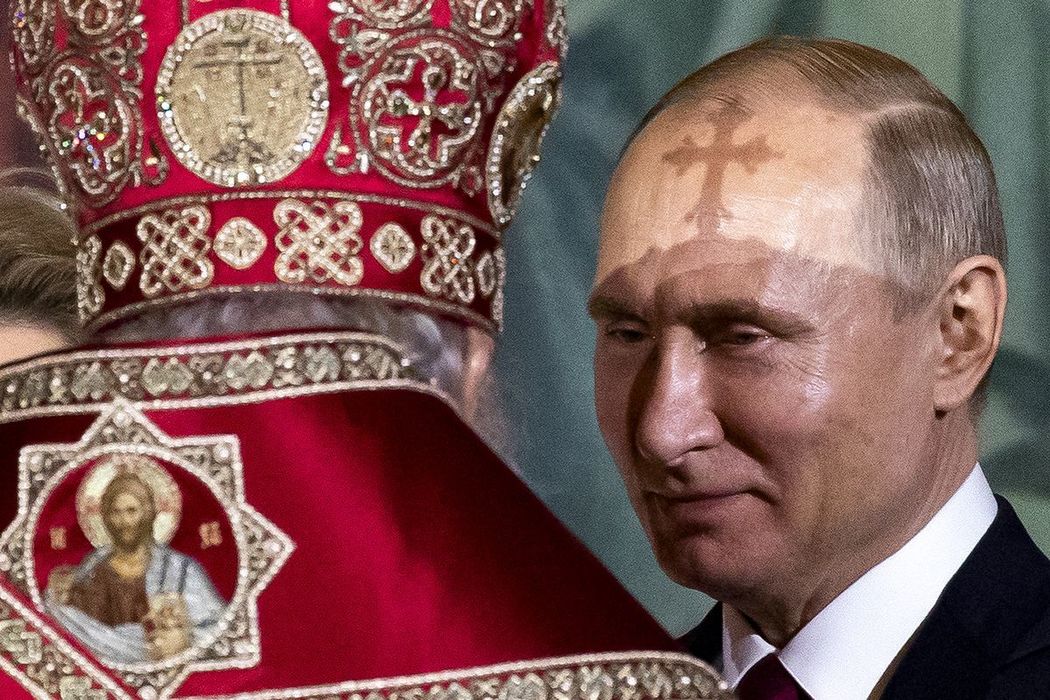The priests explained why the patriarch asked to pray for Putin’s health
[ad_1]
From a liturgical point of view, the process looks simple: several times during the liturgy there is a commemoration of the “God-protected country of our Russian, its authorities and its army”, for which prayers are offered.
On October 7 and 8, 2022, the following text, approved by Patriarch Kirill, is added to this:
“We also pray to You, the Lord our God, for the Head of the Russian State Vladimir Vladimirovich, and for the hedgehog to give him Your rich mercy and generosity, to grant him health and long life, and to deliver from all the resistances of visible and invisible enemies, to affirm spiritual wisdom and strength, all, O Lord, hear and have mercy.”
Several Moscow priests interviewed by MK did not agree to publicly discuss the theological meaning and possible prospects for such a commemoration. At the same time, they confirmed that such a prayer is offered both days. This text, like the rest of the commemorations, is proclaimed not by the priest, but by the deacon.
Meanwhile, it became known that the commemoration did not take place in some (few) Moscow parishes. “There is a call in the circulars, an instruction – that is, a recommendation, not an order, there are no canonical obstacles to not commemorating the president either,” MK was told in one of the churches in the center of Moscow, where the rector decided to refuse to commemorate heads of state.
From the point of view of sacred Tradition, it would be quite canonical to commemorate the only kind of secular authorities: the crowned and anointed monarch. That is why in 1917, when Russia ceased to be a monarchy, a serious problem arose for the Russian Orthodox Church. What was needed was a “democratic” text of commemoration reflecting the new situation.
This intermediate version, approved by the Local Council, can be heard on the recording of the Great Litany of P. Chesnokov performed by F. I. Chaliapin: of course, they did not pray for the tsar, but they commemorated the “Ecumenical Patriarchs” (this was even before the resumption of the patriarchate in Russia), and then just “Our God-protected state” and prayed already “for its salvation”.
Nevertheless, the commemoration of the head of state has remained the norm (this tradition is more than 1,500 years old), says Priest Roman Zelensky, who uses the Royal Missal at the liturgy, instead of the name of the monarch, proclaiming “his own name is You, Lord, weigh.”
“In apostolic times, there were even prayers for the health of pagan emperors, who for the most part persecuted Orthodox Christians,” notes Fr. Novel. – And if you prayed for the health of the persecutors, it is all the more necessary to pray sacredly for the Orthodox Sovereigns, who are the defenders of all piety and purity. Our Lord Jesus Christ clearly says that it is necessary to render to Caesar what is Caesar’s, that is, it is necessary to respect the Royal Authority, since it is given by God Himself.
This is how the commemoration of the sovereign sounded (who, since the time of Peter the Great, was also the head of the Russian Orthodox Church):
“For our Most Pious, Most Autocratic, Great Sovereign, Emperor Nikolai Alexandrovich of All Russia: and for His Spouse, the Most Pious Sovereign, Empress Alexandra Feodorovna: for His Mother, Most Pious Sovereign Empress Maria Feodorovna, let us pray to the Lord.”
From a canonical point of view, practically nothing should follow from the current two-day commemoration, the clergy interviewed by MK believe. Approximately on the same rights, since the mid-2010s, a prayer for the reign of peace in Ukraine has been read in churches at the liturgy, which was updated in March of this year, taking into account the current tragic circumstances.
It would be a different matter if the commemoration of the president at the liturgy became permanent. In this case, Vladimir Putin would not have become anointed tsar anyway (without the corresponding sacrament), but dissatisfied with the new custom could well stand out among the priesthood.
For clarification, we also turned to Vakhtang Kipshidze, Deputy Chairman of the Synodal Department for Church Relations with Society and the Media.
– His Holiness blessed to pray for Vladimir Putin for two days – on his birthday and the next, on the day of memory of Sergei Radonezh, who blessed Dimitri Donskoy for the Battle of Kulikovo, with a “special petition” that joins regular services at the request of parishioners in any situation, including emergencies. What does this mean? Is this some common practice?
– Yes, this is a well-established practice among the Orthodox. And they all pray for the authorities in all countries where they serve. This is an interpretation of the Gospel teaching about the divine nature of state power.
– And how should ordinary believers pray? Is this an offer or an obligation? What should be done? Put a candle on? Prayer order?
– Everyone prays as he sees fit, using, of course, the Prayer Book. It is impossible to make you pray. This is a matter of conscience of each person. There is an old adage “a slave is not a pilgrim”, so everyone ultimately understands this decision and makes this choice for himself, from his heart.
[ad_2]
Source link









